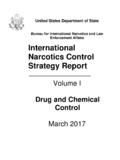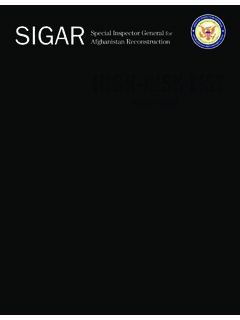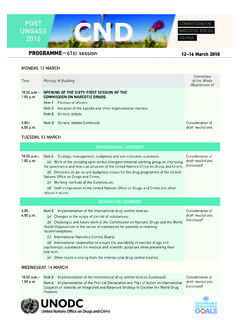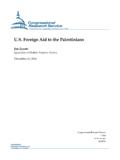Transcription of BACKGROUND DOCUMENT - OECD
1 19-20 April 2016 OECD Conference CentreParis, FranceFIGHTING THE HIDDEN TARIFF: GLOBAL TRADE WITHOUT CORRUPTION2016 OECD Integrity ForumBACKGROUND DOCUMENT 1 FIGHTING THE HIDDEN TARIFF: GLOBAL TRADE WITHOUT CORRUPTION BACKGROUND DOCUMENT for the 2016 OECD Integrity Forum This BACKGROUND DOCUMENT provides an analytical framework to shape the policy debate on integrity and international trade at the OECD Integrity Forum on 19-20 April, 2016. The BACKGROUND DOCUMENT will include additional considerations brought forward at the Forum, to guide future work on promoting integrity in international trade.
2 The BACKGROUND DOCUMENT has been prepared by the Public Sector Integrity Division of the OECD s Directorate for Public Governance and Territorial Development, and benefited from invaluable comments and input from the Reform of the Public Sector Division, from the Directorate on Trade and Agriculture (Development Division) and the Directorate on Financial and Enterprise Affairs (Anti-Corruption Division, Corporate Affairs Division and Investment Division). Forum participants are encouraged to provide written feedback and specific comments to Frederic St-Martin 2 TABLE OF CONTENTS Acronyms and abbreviations.
3 3 Executive Summary .. 4 Introduction .. 6 1. How trade is shaping the world today .. 6 2. The issue: the cost of corruption hampering trade .. 7 Lower revenues for the public sector .. 7 Increasing overhead costs and limiting market access for 8 3. Mapping integrity risks in the global supply chain .. 10 The complexity of the global supply chain .. 10 Actors most vulnerable to integrity risks .. 11 4. The twin devils of corruption and illicit trade .. 14 Organized crime benefits from complexities in global supply chains.
4 14 Consequences of illicit and counterfeit trade for citizens .. 15 5. Towards integrity strategies for clean 16 Including transparency and anti-corruption provisions in trade agreements .. 17 Preventing corruption in customs administrations and border control .. 19 Protecting supply chains through due diligence standards and promoting responsible business conduct .. 21 Collective action to overcome corruption vulnerabilities .. 23 Detecting corruption through enhanced audit and cross-border collaboration .. 24 Enforcing cross-border bribery offences more effectively.
5 24 6. Conclusion .. 25 References .. 27 Figures 1. World trade and GDP growth, 1991-2014 .. 7 2. Business perspective: the most problematic factors for trade .. 8 3. Estimated ''tax'' bribery imposed on businesses in Eastern Europe and central Asia, 2010 .. 9 4. Simplified global supply chain .. 11 Boxes 1. La Linea Corruption Case ..13 2. Example of counterfeit glycerine in Panama .. 15 3. Trade Facilitation Indicators: assessing the benefits of a more transparent and streamlined border process .. 18 4. The World Customs Organization Arusha Declaration.
6 20 5. Combatting the illegal exploitation of natural resources through supply chain due diligence .. 22 3 Acronyms and abbreviations ANAO BEEPS Australian National Audit Office Business Environment and Enterprise Performance Survey CCAB Consultative Committee of Accountancy Bodies FAO Food and Agriculture Organization of the United Nations FCPA Foreign Corrupt Practices Act GRIP Groupe de recherche et d information sur la paix et la s curit HFW Holman Fenwick Willan IFC international Finance Corporation ITC international Trade Center OECD Organisation for Economic Cooperation and Development SEC Securities and Exchange
7 Commission TI Transparency international UN United Nations UNCTAD United Nations Conference on Trade and Development UNECE United Nations Economic Commission for Europe UNODC United Nations Office for Drugs and Crime WBG World Bank Group WCO World Customs Organization WEF World Economic Forum WHO World Health Organization WTO World Trade Organization 4 Executive Summary international trade has driven the global economy and development during the last few decades. Trade has risen in nearly all parts of the world, becoming one of the most dynamic sources of growth and a powerful enabler of economic development for many countries.
8 In 2014, the total world exports of goods and services amounted to USD trillion, of which the OECD countries generated USD 14 trillion, and the total imports of goods and services reached USD trillion, of which trillion were accounted for by OECD countries. Considering the importance of international trade for global economic growth, the costs generated by non-tariff barriers, such as those related to the lack of integrity in border control and customs administrations, can be quite significant for the public and private sectors, citizens and society as a whole.
9 Loss of revenue caused by customs-related corruption is estimated to cost World Customs Organization (WCO) members at least USD 2 billion in customs revenue each year, with India losing USD 334 million and Russia USD 223 million. Moreover, unnecessary trade barriers created by non-transparent, burdensome rules and procedures can constitute vulnerabilities that may create important incentives to engage in corrupt behaviour. Trade facilitation measures have the potential to benefit all countries.
10 It is estimated that a complete implementation of trade facilitation measures arising from the WTO Trade Facilitation Agreement could reduce trade cost by for low income countries, by for lower middle income countries, by for upper middle income countries, and by for OECD countries. Implementing appropriate governance structures, accountability mechanisms and integrity policies in customs administrations alone has the potential to reduce trade costs by between and for the same country groups. These measures seek to eliminate opportunities for customs policy capture, extortion, offering bribes, as well as for numerous schemes allowing for the avoidance of taxes and tariffs, such as underreporting of exports and over-invoicing of imports.
















